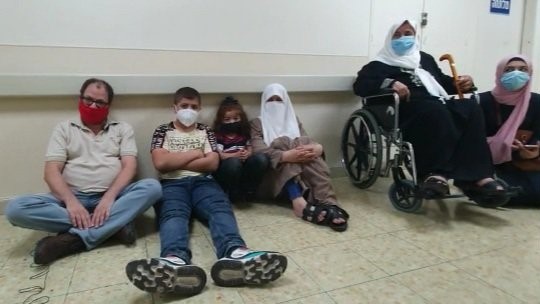Leading member of the Communist Party of Israel (CPI), Hadash MK Ofer Cassif (Joint List), and the family of Palestinian hunger-striker Maher al-Akhras, 49, announced on Saturday, October 24, that they would join him in his action after Israeli authorities refused to allow them to visit the hospitalized political prisoner, despite fears that he is close to death. Cassif, Akhras’s mother, his wife and their three eldest sons started a solidarity hunger strike outside the room where he is being detained at the Kaplan Medical Centre in Rehovot. They have been there for a number of days but have been prevented from seeing al-Akhras despite growing fears for his health. On Sunday night, they finished their hunger strike after being allowed a brief visit with the Palestinian prisoner.

MK Ofer Cassif, left, and Maher al-Akhras’s family during their solidarity hunger strike outside the room where the Palestinian prisoner is being detained at the Kaplan Medical Center in Rehovot (Photo: Zo Haderech)
Last week Physicians for Human Rights warned that even if he ended his fast, the damage to Akhras’s vital organs could be permanent. On Thursday, October 22, the International Committee for the Red Cross urged Israeli authorities “to find a solution that will avoid any loss of life.” Head of the ICRC Health Department in Israel & the Occupied Palestinian Territories, Yves Giebens, said that his group had been closely monitoring the situation. “From a medical perspective, he is entering a critical phase,” said Giebens.
In addition, a UN Palestinian rights official on Friday, October 23, called for Akhras to be released, saying he was in a precarious medical condition. “Al-Akhras is now in very frail condition,” Michael Lynk, the Special Rapporteur on Palestinian territories told the Wafa news agency. “Recent visits by doctors to his hospital bed in Israel indicate that he is on the verge of suffering major organ failure, and some damage might be permanent.”
On Friday, the Israeli army informed al-Akhras’s lawyer that Kaplan hospital was no longer willing to keep him, due to the fact that he refused their medical treatment, and also claimed that his visitors endangered other patients with viruses. This contradicted the High Court decision given on September 22, more than a month ago, that due to his medical situation al-Akhras did not constitute a danger. Since that hearing he had continued to be on his hunger strike, and there were clear medical reports outlining his deteriorating health to the point of imminent danger to his life or permanent damage to his bodily systems. It also contradicted the prison medics themselves who stated on September 9 that they could not treat him.
But US Secretary of State Mike Pompeo waded in to defend Israeli occupation authorities for holding al-Akhras, saying that “Israel has the right to defend itself” and can introduce any security measures it deems fit. Al-Akhras started his hunger strike on July 27 after he was jailed on an “administrative detention” order, meaning he can be held indefinitely without knowing the charges against him or being brought before a judge.
On Sunday, October 25, the three major Palestinian Arabic daily newspapers focused on the news of al-Akhras’s family joining him in his open-ended hunger strike to protest his detention without due process. Al-Quds, Al-Ayyam and Al-Hayat Al-Jadida reported how the family of Palestinian detainee Maher al-Akhras who has been on hunger strike since late July in protest of his detention without due process by the Israeli occupation authorities, announced the day before that they had started a hunger strike in support of their son, husband and father.
Related:


